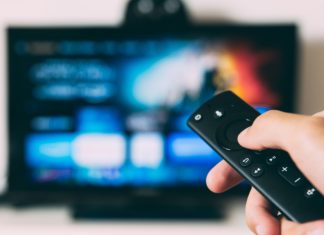Seven in 10 Shoppers for Consumer Electronics Influenced by Digital Advertising
PHOENIX – The synergy between the consumer shopping behavior of showrooming and internet product research, as well as digital advertising and online purchasing, is becoming increasingly pronounced and interdependent – and consumer electronics brands can benefit by adjusting their marketing strategies, according to a new study released today by the Interactive Advertising Bureau (IAB). Unveiled at the sixth IAB Annual Leadership Meeting: “Big Data & Big Ideas: Friends, Enemies, or Frenemies?,” held at the Arizona Biltmore in Phoenix, “Showrooming: Empowering Consumer Electronics Shoppers,” focuses on consumer electronics and explores the influence of mobile devices on the retail shopping process, general shopping behaviors in physical stores and online, and the broader showrooming concept.
The research, conducted by Ipsos MediaCT in partnership with IAB, complements last year’s IAB report “The Path to Consumer Electronics Purchases,” which showed that digital media is a vital influence on consumer electronics shoppers.
The new IAB study reveals the prominence and importance of mobile device usage by shoppers in the consumer electronics showrooming experience. The most significant finding in the mobile component of the research was that while 42 percent of in-store mobile device using shoppers ultimately made their purchase online, a full 30 percent made their purchase in the store.
Interestingly, those who used their mobile phones while shopping were also more likely to make an unplanned purchase (32% in-store vs. 22% online).
Other mobile-related findings:
- 42 percent of those who used a mobile device while in-store spent over $1000
- Among mobile device owners who didn’t use their device in-store, only 21 percent spent over $1000
- 65 percent of shoppers who use their mobile device in-store said it made them more likely to buy the product
“Given these findings, more than ever mobile is the connective tissue in showrooming that is driving a more integrated shopping experience in the consumer electronics space,” said Anna Bager, Vice President and General Manager, Mobile Marketing Center of Excellence, IAB. “It has become an impactful ecosystem unto itself, with huge strategic implications for brands – while at the same time empowering consumers with more real-time information and choices in their online and offline shopping.”
Digital advertising was also a notable factor in the showrooming experience for consumers, according to the study. Over a third of shoppers (35%) recalled seeing ads for consumer electronics they were shopping for, and among those shoppers, over 7 in 10 said that they had viewed digital ads. Furthermore, digital ads heavily influenced consumer behavior in shopping for electronics. Half of those surveyed said that digital ads made them visit an online store, while 28 percent of respondents said digital ads drove them to shop at a bricks-and-mortar retail location.
Other key research results:
- Among in-store shoppers, over a quarter (27%) intended to showroom by trying out the products in the store and then buy online
- More than 3 in 4 consumers did some form of online research, on a personal computer or mobile device, prior to going to a store; mainly checking prices, reading reviews and looking up product features
- The top three drivers for purchasing in-store are, in order, convenience, trying/seeing the product, and price
- In comparison, the top ranked motivators for purchasing online are price, convenience, and selection/availability
“It’s clear from the study’s results that showrooming is a multifaceted and increasingly sophisticated consumer behavior,” said Sherrill Mane, Senior Vice President, Research, Analytics and Measurement, IAB. “The implication for consumer electronics retailers is enormous – they will thrive more quickly when they execute a marketing strategy whose nexus is the synthesis of online, mobile and offline shopping experiences.”
To download the entire “Showrooming: Empowering Consumer Electronics Shoppers,” please visit www.iab.net/showrooming.
Methodology
The “Showrooming Consumer Electronics Study” was conducted by Ipsos MediaCT in February via an online survey of 482 consumer electronics shoppers (past six months) from its HearWatchSay (HWS) community, whose members are internet savvy/internet enthusiasts. Quantitative results were supplemented with qualitative input about shopping and showrooming behaviors.
About Ipsos MediaCT
Ipsos MediaCT is the market research specialization within Ipsos built to reach, engage and more effectively understand today’s digitally-driven consumer in the fast moving media, content and technology space. We work with leading companies in technology, entertainment and all sectors of media – TV, online, print, mobile, outdoor, radio – helping owners and advertisers to better understand different audiences, the content they consume, the channels they use to consume it and the technology they use to discover, talk about and access this content. Ipsos MediaCT is a specialist division within Ipsos, one of the world’s largest market research agencies. Ipsos has offices in 84 countries, generating revenues of €1,363 billion ($1.897 billion U.S.) in 2011. Alongside media, content & technology, Ipsos has specialist practices in advertising, loyalty, marketing and public opinion research.
Visit www.ipsos-na.com/media to learn more.
About the IAB
The Interactive Advertising Bureau (IAB) is comprised of more than 500 leading media and technology companies that are responsible for selling 86% of online advertising in the United States. On behalf of its members, the IAB is dedicated to the growth of the interactive advertising marketplace, of interactive’s share of total marketing spend, and of its members’ share of total marketing spend. The IAB educates marketers, agencies, media companies and the wider business community about the value of interactive advertising. Working with its member companies, the IAB evaluates and recommends standards and practices and fields critical research on interactive advertising. Founded in 1996, the IAB is headquartered in New York City with a Public Policy office in Washington, D.C. For more information, please visit www.iab.net.








